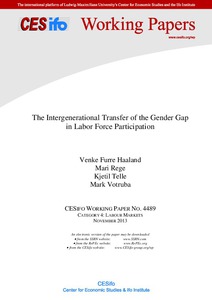The intergenerational transfer of the gender gap in labor force participation
"Despite well-documented convergence during the later years of the 20th century, labor force attachment remains markedly higher for men than for women. The current paper employs rich longitudinal registry data to investigate the intergenerational transfer of the gender gap in labor force partic...
| Main Authors: | , , , |
|---|---|
| Institution: | ETUI-European Trade Union Institute |
| Format: | TEXT |
| Language: | English |
| Published: |
Munich
2013
CESifo |
| Subjects: | |
| Online Access: | https://www.labourline.org/KENTIKA-19122072124919402549-The-intergenerational-transfer.htm |
| Summary: | "Despite well-documented convergence during the later years of the 20th century, labor force attachment remains markedly higher for men than for women. The current paper employs rich longitudinal registry data to investigate the intergenerational transfer of the gender gap in labor force participation. We explore the extent that family- and community-level characteristics, measured in childhood, differentially predict the likelihood of employment for adult Norwegian men and women. Drawing on theories pertaining to the importance of information, skills and gender norms transfer, our empirical analysis demonstrates that a parsimonious set of family- and community-level characteristics can explain a substantial part of the gender gap. These results suggest that female labor force participation is constrained by the intergenerational transfer of beliefs and expectations about family and work." |
|---|---|
| Physical Description: | 49 p. Digital |

